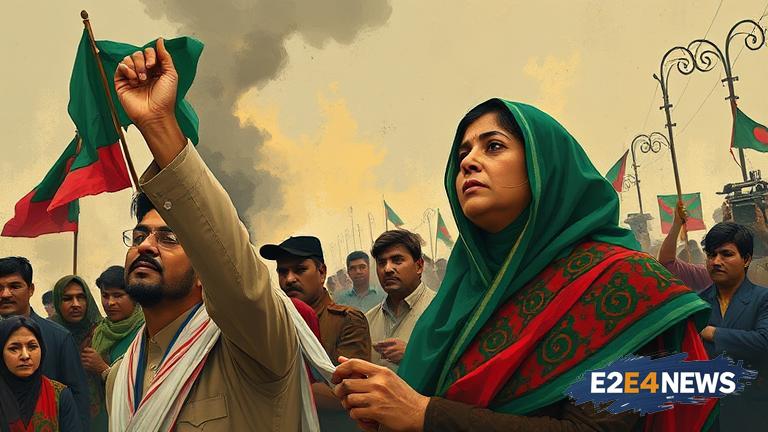Bangladesh is currently facing a period of significant turmoil and disillusionment, one year after the ouster of Prime Minister Sheikh Hasina. The country has been plagued by unrest, violence, and economic instability, leaving many citizens feeling hopeless and uncertain about their future. The ouster of Sheikh Hasina, who had been a dominant figure in Bangladeshi politics for many years, was seen as a major blow to the country’s democratic institutions and has led to a power vacuum that has yet to be filled. Muhammad Yunus, a Nobel laureate and former banker, had been touted as a potential savior for the country, but his failure to deliver on promises has disappointed many, particularly Islamists who had seen him as a potential alternative to traditional politicians. The Islamists, who have been gaining strength in recent years, have been vocal in their criticism of Yunus and the current government, which they see as corrupt and ineffective. The country’s economy has also been struggling, with high levels of inflation, unemployment, and poverty, making it difficult for many citizens to make ends meet. The situation has been further complicated by the COVID-19 pandemic, which has had a devastating impact on the country’s economy and healthcare system. The government has been criticized for its handling of the pandemic, with many accusing it of being slow to respond and inadequate in its support for those affected. The opposition, led by the Bangladesh Nationalist Party (BNP), has been vocal in its criticism of the government, calling for fresh elections and an end to the current state of emergency. The BNP has also been critical of the government’s handling of the economy, accusing it of mismanaging the country’s finances and failing to address the root causes of poverty and inequality. Despite the challenges facing the country, there are still many who remain hopeful that Bangladesh can overcome its current difficulties and emerge stronger and more stable in the future. However, this will require significant reforms and a commitment to democratic principles and the rule of law. The international community has a role to play in supporting Bangladesh during this difficult time, and it is imperative that the country receives the support and assistance it needs to overcome its current challenges. The United States, European Union, and other major powers have a responsibility to support democracy and human rights in Bangladesh, and to help the country address its economic and social challenges. The situation in Bangladesh is complex and multifaceted, and there are no easy solutions to the country’s problems. However, with the right support and leadership, it is possible for Bangladesh to overcome its current difficulties and emerge as a stable and prosperous democracy. The country has a rich history and culture, and its people are known for their resilience and determination. With the right policies and support, it is possible for Bangladesh to unlock its full potential and become a major player in regional and global affairs. The current situation in Bangladesh is a reminder that democracy and stability are not guaranteed, and that constant effort and vigilance are required to protect and promote these values. The international community must remain engaged and supportive of Bangladesh during this difficult time, and work to help the country overcome its current challenges and achieve a brighter future. The future of Bangladesh is uncertain, but with the right support and leadership, it is possible for the country to emerge stronger and more stable than ever before. The country’s citizens deserve nothing less, and it is the responsibility of the international community to support them in their quest for democracy, stability, and prosperity. In conclusion, Bangladesh is facing significant challenges one year after the ouster of Sheikh Hasina, but with the right support and leadership, it is possible for the country to overcome its current difficulties and emerge as a stable and prosperous democracy. The international community has a critical role to play in supporting Bangladesh during this difficult time, and it is imperative that the country receives the support and assistance it needs to address its economic and social challenges.





